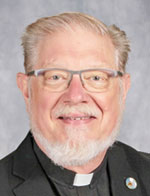That All May Be One / Fr. Rick Ginther
Catholic-Lutheran dialogue is building bridges across faith traditions
 (The following column is written by Anders Kilmark. A member of Nativity of Our Lord Jesus Christ Parish in Indianapolis, he serves on the Advisory Board of the archdiocesan Office of Ecumenism and Interreligious Affairs. A child of a mixed religion marriage—one of his parents was Catholic, the other was Lutheran—Anders is married to his wife Cheryl, a Methodist. He writes this piece from his lived ecumenical perspective.)
(The following column is written by Anders Kilmark. A member of Nativity of Our Lord Jesus Christ Parish in Indianapolis, he serves on the Advisory Board of the archdiocesan Office of Ecumenism and Interreligious Affairs. A child of a mixed religion marriage—one of his parents was Catholic, the other was Lutheran—Anders is married to his wife Cheryl, a Methodist. He writes this piece from his lived ecumenical perspective.)
Halloween is always a fun day of costumes, candy and scary movies. Catholics and many mainline Protestants have another reason to celebrate: saints, both canonized and in our own families.
But for Protestants, the day has another special significance.
This year, Oct. 31 marked the 507th anniversary of the start of the Protestant Reformation. That day, Martin Luther is said to have nailed his 95 theses to the door of All Saints’ Church (also referred to as Castle Church) in Wittenberg, Germany.
What started as a sincere effort to bring reform from within the Church tragically led to a splintering of the Church.
The Reformers disagreed with the Catholic Church on many topics—indulgences, the role of Mary, the canon of Scripture.
But most fundamental was a disagreement on how sinful man is made right with God: justification.
How are we saved? Is it by faith alone? Or must we also live a life marked by Christian charity, filled with good works? Can we lose our salvation during the course of our lives through sin? Or are the baptized eternally secure in their salvation?
Bitter division on these questions led to mutual condemnations between Roman Catholics and Protestants. Christians who once worshiped together began to see each other as enemies.
But our story would not end there. At the Last Supper, Christ prayed for his Church that they would remain one as he and the Father are one. And Christ’s prayer will not be denied.
The 20th century saw significant change in the hearts of Christians worldwide. The Holy Spirit inflamed the hearts of the faithful to re-engage one another. For Roman Catholics, the Second Vatican Council urged ecumenical dialogue.
But if Western Christianity was to overcome the centuries-old division, the question of justification would need to be addressed.
Fittingly, healing began where the wound began—between Roman Catholics and Lutherans. Through decades of studying and reading Scripture together, it became increasingly clear that the differences between them were more about emphasis than substance. They were not so divided after all.
In 1999, the Lutheran World Federation and the Catholic Church published a document called the “Joint Declaration on the Doctrine of Justification” (JDDJ).
In it, they boldly and joyfully declared that Catholics and Lutherans of the federation could now articulate a common understanding of this “first and chief article of the Christian religion” (as Luther called it). Fittingly, each tradition retained its particular emphasis. And the mutual condemnations of the 16th century no longer applied.
This was just the beginning. In 2006, the World Methodist Council officially joined the JDDJ. The Anglican Consultative Council would join 10 years later, and the World Communion of Reformed Churches would sign on the next summer.
As a result, 75% of Christians worldwide by way of denomination affiliation are now united by the JDDJ. And there is a push within some Baptist circles to join in the future.
In just a couple dozen pages, the JDDJ accomplished a significant ecumenical achievement. It moved Christians in a concrete way toward healing. Furthermore, the work it took to produce the JDDJ provided a now-proven method of fruitful dialogue.
This Halloween marked the 25th anniversary of the signing of the JDDJ.
As Christians, let us use this occasion to take time to read the declaration. As we read, let us remember and mourn the things that still divide us. And let us take courage in the Spirit whose power to gather and unite us is greater than our divisions.
May we learn from the example of the JDDJ. May we commit ourselves to the hard work of cooperation with God’s grace so that Christ’s prayer for our unity may be fulfilled in us!
(Father Rick Ginther is director of the archdiocesan Office of Ecumenism and Interreligious Affairs. He is also the pastor of Our Lady of Lourdes Parish in Indianapolis.) †
 (The following column is written by Anders Kilmark. A member of Nativity of Our Lord Jesus Christ Parish in Indianapolis, he serves on the Advisory Board of the archdiocesan Office of Ecumenism and Interreligious Affairs. A child of a mixed religion marriage—one of his parents was Catholic, the other was Lutheran—Anders is married to his wife Cheryl, a Methodist. He writes this piece from his lived ecumenical perspective.)
(The following column is written by Anders Kilmark. A member of Nativity of Our Lord Jesus Christ Parish in Indianapolis, he serves on the Advisory Board of the archdiocesan Office of Ecumenism and Interreligious Affairs. A child of a mixed religion marriage—one of his parents was Catholic, the other was Lutheran—Anders is married to his wife Cheryl, a Methodist. He writes this piece from his lived ecumenical perspective.)